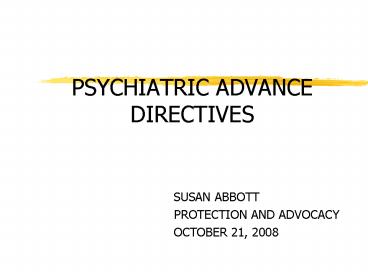PSYCHIATRIC ADVANCE DIRECTIVES - PowerPoint PPT Presentation
1 / 19
Title:
PSYCHIATRIC ADVANCE DIRECTIVES
Description:
The Comp Care where you receive services. QUESTIONS AND ANSWERS ... 2: If your behavior is considered harmful to yourself or others. ... – PowerPoint PPT presentation
Number of Views:85
Avg rating:3.0/5.0
Title: PSYCHIATRIC ADVANCE DIRECTIVES
1
PSYCHIATRIC ADVANCE DIRECTIVES
- SUSAN ABBOTT
- PROTECTION AND ADVOCACY
- OCTOBER 21, 2008
2
What is an Advance Directive?
- Legal document for individuals with mental health
diagnosis - Directive for possible psychiatric treatment
- Passed in 2003 by the Kentucky General Assembly
House Bill 99 - You prepare it in advance
3
WHY ARE ADVANCE DIRECTIVES IMPORTANT?
Have you ever
- Been given a medication that you knew would cause
unpleasant side effects? - Been ignored when you made suggestions about your
treatment? - Gone to a hospital or treatment program where you
have had an unpleasant side experience?
4
- Wanted a friend or family member to have input
into your treatment? - Wanted to suggest an alternative treatment but
were ignored by a mental health professional? - Wanted to designate someone to make certain
decisions for you?
5
WHAT CAN AN ADVANCE DIRECTIVE DO FOR YOU?
- Empowerment
- Improve opportunities for preventive care
- Improve informed consent processes
- Decrease hospitalizations
- Reduce civil commitment to a psychiatric hospital
- Assist families
6
ADVANCE DIRECTIVES
- Describe what treatment should be provided to you
under what circumstance - Help you to plan your preferences for treatment
before you are in a crisis - Empowers you to make your treatment preferences
known - Improves communication between you and your
doctor - May prevent forced treatment
7
WHAT DOES AN ADVANCE DIRECTIVE INCLUDE?
- Naming a surrogate
- Listing psychotropic medications that you prefer
- Listing psychotropic medications that you do not
want if you are hospitalized - Preferences regarding electroconvulsive therapy
(ECT)
8
- Preferred procedures for emergency interventions
- Your signature
- Signature of witnesses
- Name, address and phone number of your surrogate
9
WHAT IS A DESIGNATED SURROGATE?
- Someone you can trust to make decisions for you,
if you cannot speak for yourself. This person
should be someone you know well, trust and would
make the decisions you would want them to make.
10
WHO CAN BE A DESIGNATED SURROGATE?
- Family members
- Friends
- People who attend therapeutic rehabilitation
programs (TRP) who do not have an appointed
guardian - People who live in your personal care home who do
not have an appointed guardian
11
WHO CANNOT BE A DESIGNATED SURROGATE?
- Employees of mental health facilities
- Employees of Comp Care Centers
- Your therapist
- Your doctor
- Employees of personal care homes
- Employees of therapeutic rehabilitation programs
12
IF YOU ARE UNABLE TO THINK OF SOMEONE TO BE YOUR
SURROGATE THAT IS OKAY.YOU DO NOT HAVE TO NAME
A SURROGATE IN ORDER TO COMPLETE AN ADVANCE
DIRECTIVE.
13
WHO IS A GRANTOR?YOU!!! THE PERSON WHO FILLS
OUT THE ADVANCE DIRECTIVE
14
WAYS TO MAKE AN ADVANCE DIRECTIVE WORK FOR YOU
- Think it through
- Be descriptive
- Be reasonable
- Discuss it with your treatment providers and
surrogate - Execute it properly
- Distribute it to those who need to know about it
- Access an advocate, if needed
15
WHO SHOULD HAVE COPIES OF YOUR ADVANCE DIRECTIVE?
- You!!
- Your designated surrogate
- The psychiatric hospital that you to to when you
are hospitalized - The Comp Care where you receive services
16
QUESTIONS AND ANSWERSQ Can I change my mind
about an advance directive?A Yes however you
must make sure that the old advance directive is
discarded and a new one is completed and given to
the appropriate people.
17
2 If your behavior is considered harmful to
yourself or others. The hospital should honor
your preferred procedures for emergency
interventions including medications listed in
your advance directive.
18
Q Who can witness my advance directive?A An
individual who is over the age of 18 and does not
have a guardian andAnyone who is not an
owner, operator, employee or relative of an owner
of the healthcare facility where you receive
services or where you live.
19
Q Can a facility ignore my advance
directive?A No, if your advance directive is
ignored call Protection and Advocacy1-502-564-2
9671-800-372-2988

